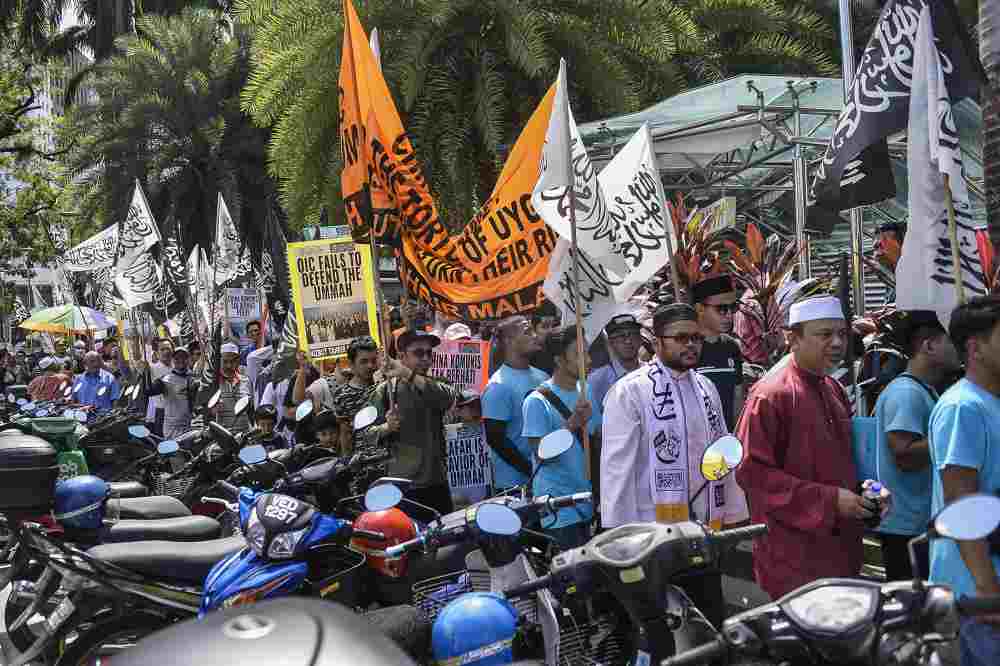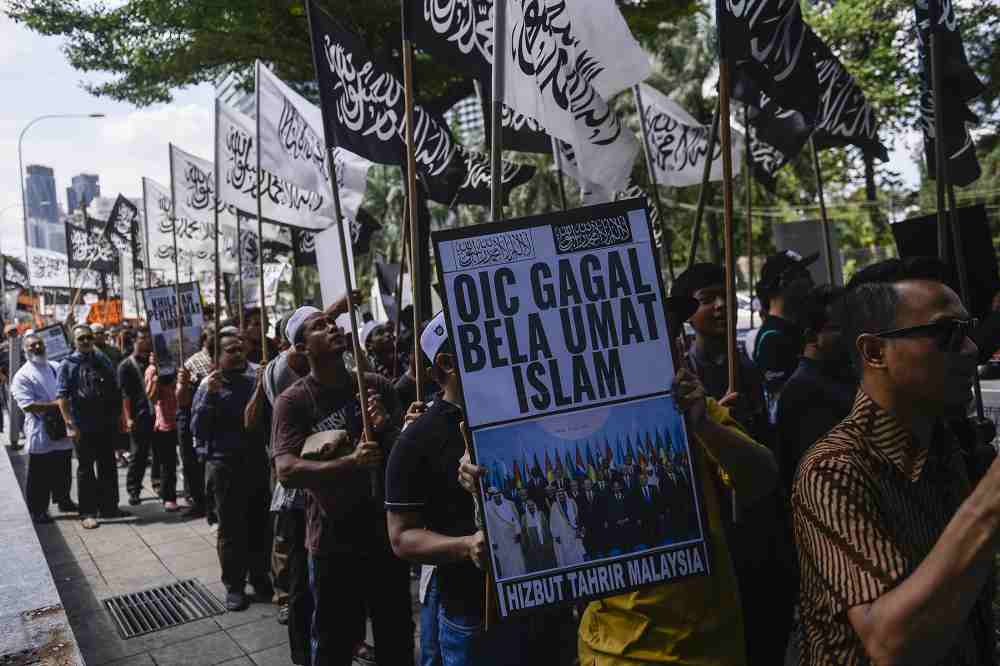KUALA LUMPUR, Dec 28 — Hundreds of Muslims protested against the Chinese embassy yesterday after Friday prayers, to protest the treatment of the Uighur Muslims in Xinjiang province in China.
Yesterday’s protest was only the latest in a series of demonstrations from Malaysians demanding that Beijing stop its alleged brutality and the detention of the roughly one million Uighur minority in concentration camps to force the minority group to renounce their faith.
The Chinese government on the other hand has consistently denied the allegations, saying that the concentration camps are actually vocational camps to “normalise” and train the Uighur minority away from religious extremism.
Here are three observations by Malay Mail from the protest:

Moderates and hardliners came together, but clashed on approach
There were actually two separate marches which inevitably converged at the Chinese Embassy here, one led by the Malaysian Muslim Youth Movement (Abim), and the other by pro-caliphate group Hizbut Tahrir Malaysia (HTM).
Together with groups such as Global Peace Mission Malaysia, National Union of Malaysian Muslim Students, and Southeast Asia Muslim Students Federation, Abim laid out six demands including to respect the Uighurs’ right to life, and freedom of religion and belief.
Despite that, Abim secretary-general Mohammad Fazril Mohd Saleh stressed that they were not there to create conflict between Putrajaya and Beijing, but only wished for an explanation from Ambassador Bai Tian on the real situation on the ground without any form of propaganda.
As a gesture of peace and reflecting the ties of friendship between Malaysia and China, they hoisted a stuffed panda bear holding a hibiscus — which he said symbolised the long-term trade and peaceful relations between two countries.
But this was shadowed by a more confrontational and fiery rhetoric from HTM, which demanded that Putrajaya sever all diplomatic ties with China, suspend all trade, close down its embassy there and expel its ambassador from the country, in retaliation.
“If China refuses to heed the earlier warning, then Malaysia must issue a final military warning to them, and prepare to declare ‘jihad’ upon them and rescue the oppressed,” HTM spokesman Abdul Hakim Othman said, using the Arabic term for “holy struggle”.

Unintended promotion for Hizbut Tahrir
While Abim and its allies only managed to muster tens of supporters, there were perhaps hundreds of those that came for HTM, leading to a more forceful image—despite the group being declared “deviants” in neighbouring Selangor, and Sabah.
Waving their black and white flags with placards with messages such as: “Caliphate is the saviour of the ummah”, “OIC has failed to defend Muslims”, and an orange banners saying “We need the caliphate to protect and save the Uighur Muslims”, the protest became a platform to spread its goal for a pan-Islam worldwide rule of a caliph.
Earlier this month, HTM had controversially chided the term limit for a prime minister as a “shallowness” of the democratic process, and also criticised the Universal Human Rights Declaration for allegedly opposing God’s law.
But it has also consistently spoken up in support of the persecuted Uighurs, which may draw more emotional support and sympathy from many Muslims who might have missed and are unaware of its political agenda.
With the Pakatan Harapan government’s stance towards the Uighurs ranging from Prime Minister Tun Dr Mahathir Mohamad downplaying the issue as Beijing’s “internal affair” to de facto religion minister Datuk Mujahid Yusof Rawa’s acquiescence of the detentions, HTM may yet achieve more attention.

The Chinese embassy don’t give a toss what Malaysians think
Bai Tian has repeatedly turned a deaf ear and ignored those trying to deliver the memorandums to his government through the embassy here—including yesterday’s protests.
It marked the third protest and effort to submit a memorandum to him by various Muslim groups in the country, signalling Beijing’s refusal to accept or acknowledge counterclaims against their narrative over their alleged human rights violations against the Uighur people.
Previously, Abim had held a protest and tried to submit their first memorandum to the embassy on July 5, 2019. It failed and was left waiting outside the embassy’s door — basically being ignored by Bai Tian.
On December 21, several members of Muslims groups and PAS staged a silent protest in support of the allegedly persecuted Uighur minority, at the entrance of the Beautiful Xinjiang Cultural Show organised by the Chinese embassy in Bangi Avenue Convention Centre.
On Christmas Eve, Parti Pribumi Bersatu Malaysia’s Youth wing along with Malay rights group Perkasa, students’ group Gabungan Pelajar Melayu Semenanjung and the Malay Economic Action Council had also gathered before the embassy but was once again snubbed by the ambassador and his staff.

Instead, a spokesman with the embassy Tang Tang had in response urged Muslims to visit Xinjiang rather than trusting what he termed “distorted reports flooded in social media” — releasing his remark with English daily The Star.
With Bai Tian claiming in an opinion piece sent to local media outlets earlier this month that he could count Malaysian officials, journalists, and Muslim groups, including federal Islamic authority Jakim’s director-general Datuk Mohamad Nordin Ibrahim as supporters, perhaps he has nothing to fear.



















